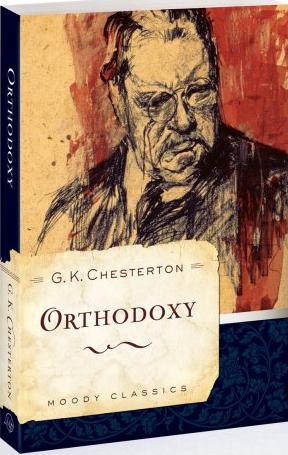“Alone of all creeds, Christianity has added courage to the virtues of the Creator. For the only courage worth calling courage must necessarily mean that the soul passes a breaking point and does not break.” And thus began my courageous adventure into G.K. Chesterton’s Orthodoxy at the recommendation of a friend. After reading this book, I was grateful to find out that Chesterton liked to employ a literary method that he called “Uncommon Sense”. That revelation helped me understand why I struggled to follow parts of the book. Overall, I could clearly tell that Chesterton was using this book to work out his own thoughts on Christianity, religion, and tradition. I appreciated his dry humor that kept me reading along for the next humorous quip.
Chesterton wrote this book almost 100 years ago, but there is still a very compelling message for our generation in light of the struggles of our culture. “In so far as religion is gone, reason is going.” God has called Christians to keep their minds sharp to the false teachings that abound. We cannot continue to lose ground in this battle for the hearts and minds of our generation.
Here are some things that I highlighted while reading…
- How can we contrive to be at once astonished at the world and yet at home in it?
- I wish to set forth my faith as particularly answering this double spiritual need, the need for that mixture of the familiar and the unfamiliar which Christendom has rightly named romance.
- I did try to found a heresy of my own; and when I had put the last touches to it, I discovered that it was orthodoxy.
- When the word “orthodoxy” is used here it means the Apostles’ Creed, as understood by everybody calling himself Christian until a very short time ago and the general historic conduct of those who held such a creed.
- Complete self-confidence is not merely a sin; complete self-confidence is a weakness.
- Certain new theologians dispute original sin, which is the only part of Christian theology which can really be proved.
- In short, oddities only strike ordinary people. Oddities do not strike odd people. This is why ordinary people have a much more exciting time; while odd people are always complaining of the dulness of life.
- The poet only asks to get his head into the heavens. It is the logician who seeks to get the heavens into his head. And it is his head that splits.
- The madman is not the man who has lost his reason. The madman is the man who has lost everything except his reason.
- Mysticism keeps men sane. As long as you have mystery you have health; when you destroy mystery you create morbidity. The ordinary man has always been sane because the ordinary man has always been a mystic.
- The whole secret of mysticism is this: that man can understand everything by the help of what he does not understand. The morbid logician seeks to make everything lucid, and succeeds in making everything mysterious. The mystic allows one thing to be mysterious, and everything else becomes lucid.
- A man was meant to be doubtful about himself, but undoubting about the truth; this has been exactly reversed. Nowadays the part of a man that a man does assert is exactly the part he ought not to assert–himself. The part he doubts is exactly the part he ought not to doubt–the Divine Reason.
- For the old humility made a man doubtful about his efforts, which might make him work harder. But the new humility makes a man doubtful about his aims, which will make him stop working altogether.
- In so far as religion is gone, reason is going.
- This is what I have called guessing the hidden eccentricities of life. This is knowing that a man’s heart is to the left and not in the middle. This is knowing not only that the earth is round, but knowing exactly where it is flat. Christian doctrine detected the oddities of life. It not only discovered the law, but it foresaw the exceptions. Those underrate Christianity who say that it discovered mercy; any one might discover mercy. In fact every one did. But to discover a plan for being merciful and also severe– THAT was to anticipate a strange need of human nature. For no one wants to be forgiven for a big sin as if it were a little one.
- A miracle only means the liberty of God.
- All Christianity concentrates on the man at the cross-roads.
- The only courage worth calling courage must necessarily mean that the soul passes a breaking point–and does not break.
- Faith the mother of all worldly energies, but its foes are the fathers of all worldly confusion.
- There was something that He hid from all men when He went up a mountain to pray.
- There was something that He covered constantly by abrupt silence or impetuous isolation.
- There was some one thing that was too great for God to show us when He walked upon our earth; and I have sometimes fancied that it was His mirth.
